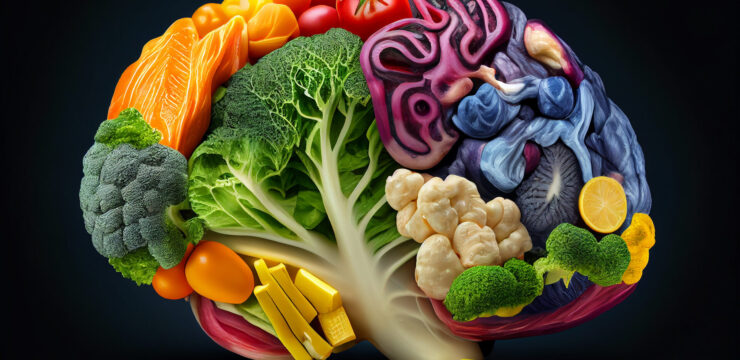In recent years, mental health has gained much-needed attention, with growing discussions surrounding various factors that contribute to psychological well-being. Among the most powerful yet often overlooked factors influencing mental health is diet. While we know that a balanced diet can help keep our bodies strong, evidence suggests it also plays a significant role in maintaining a healthy mind. Here’s a deeper look at the link between diet and mental wellness, including key nutrients that support brain health and practical tips for nourishing both body and mind.
The Science Behind Diet and Mental Health
Our brains are complex organs that require a wide range of nutrients to function optimally. Neurotransmitters, the chemicals that allow communication between brain cells, are directly influenced by the foods we eat. A deficiency in certain nutrients can disrupt the production and function of these neurotransmitters, potentially leading to mood imbalances, anxiety, depression, and other mental health challenges.
Research consistently highlights the connection between poor dietary habits and mental health problems. Diets high in processed foods, refined sugars, and unhealthy fats are often associated with a higher risk of depression and anxiety. On the other hand, nutrient-dense foods that support brain function, such as fruits, vegetables, whole grains, and healthy fats, are linked to improved mood and cognitive function.
Key Nutrients for Mental Wellness
- Omega-3 Fatty Acids Omega-3 fatty acids, found in fatty fish like salmon, flaxseeds, and walnuts, are essential for brain health. They are crucial for the formation of brain cell membranes and the production of neurotransmitters like serotonin, which help regulate mood and emotions. Research has shown that a deficiency in omega-3s may be linked to an increased risk of depression and cognitive decline.
- B Vitamins B vitamins, particularly folate, B6, and B12, are vital for mental health. These vitamins support the production of neurotransmitters and are involved in the regulation of mood. Low levels of these vitamins have been associated with an increased risk of depression, anxiety, and other mental health issues. Foods rich in B vitamins include leafy greens, legumes, eggs, and whole grains.
- Antioxidants The brain is highly susceptible to oxidative stress, which can damage brain cells and contribute to cognitive decline. Antioxidants, found in foods like berries, leafy greens, nuts, and dark chocolate, help protect the brain from this stress and support overall mental wellness. A diet rich in antioxidants has been linked to improved cognitive function and a reduced risk of neurodegenerative diseases.
- Magnesium Magnesium is a mineral that plays a crucial role in nerve function and mood regulation. Low levels of magnesium have been associated with symptoms of anxiety and depression. Foods rich in magnesium include spinach, pumpkin seeds, almonds, and legumes.
- Vitamin D Vitamin D, often referred to as the “sunshine vitamin,” is essential for brain function and mental health. Research has suggested a link between vitamin D deficiency and an increased risk of depression, especially during the winter months when sunlight exposure is limited. Vitamin D can be obtained through sunlight, fortified foods, and fatty fish like tuna and mackerel.
- Probiotics Emerging research has begun to explore the connection between gut health and mental wellness. The gut-brain axis refers to the direct communication between the digestive system and the brain. A healthy gut microbiome, supported by probiotic-rich foods like yogurt, kefir, and fermented vegetables, may help reduce symptoms of anxiety and depression by improving gut health and regulating the production of mood-related neurotransmitters.
Foods to Avoid for Better Mental Health
Just as certain foods support mental wellness, others can have a negative impact on mood and cognitive function. Here are some dietary factors to limit or avoid for better mental health:
- Refined Sugars and Processed Carbohydrates Diets high in refined sugars and processed carbs can cause spikes and crashes in blood sugar levels, leading to mood swings, irritability, and fatigue. Excessive sugar intake has also been linked to an increased risk of depression and anxiety.
- Trans Fats and Unhealthy Fats Trans fats, commonly found in fried foods, packaged snacks, and baked goods, can impair brain function and contribute to inflammation in the brain. Consuming unhealthy fats in large quantities has been associated with an increased risk of depression and cognitive decline.
- Excessive Caffeine While moderate caffeine intake can provide an energy boost, excessive consumption can lead to increased anxiety, disrupted sleep, and heightened stress. It is important to maintain a balanced intake to avoid negative effects on mental health.
- Alcohol Excessive alcohol consumption can have a detrimental effect on brain health. Alcohol is a depressant, and chronic drinking can interfere with the production of neurotransmitters, leading to mood disturbances and increased risk of depression.
Practical Tips for Improving Diet and Mental Health
Making small adjustments to your diet can have a profound impact on your mental well-being. Here are a few practical tips to nourish both your body and mind:
- Eat a Variety of Nutrient-Dense Foods Focus on incorporating a wide range of nutrient-rich foods, such as colorful fruits and vegetables, whole grains, lean proteins, and healthy fats, to provide your brain with the nutrients it needs to function at its best.
- Prioritize Omega-3s Include fatty fish, flaxseeds, chia seeds, and walnuts in your diet regularly to boost your omega-3 intake, which supports brain health and mood regulation.
- Stay Hydrated Dehydration can lead to fatigue, poor concentration, and irritability. Make sure to drink plenty of water throughout the day to stay hydrated and support optimal brain function.
- Limit Processed Foods Minimize the consumption of processed and sugary foods, as they can lead to blood sugar imbalances and negatively affect mood.
- Consider Probiotics Include probiotic-rich foods in your diet to support gut health and potentially improve mood and cognitive function.
- Don’t Skip Meals Skipping meals can lead to low blood sugar levels, which can negatively affect mood and energy levels. Aim for regular, balanced meals to keep your blood sugar stable throughout the day.
Conclusion
The connection between diet and mental wellness is undeniable. By nourishing your body with the right foods, you can improve brain function, stabilize your mood, and support overall mental health. While diet alone is not a cure-all for mental health issues, it is a powerful tool that can complement other forms of therapy and self-care. A well-balanced, nutrient-rich diet is essential not only for physical health but also for achieving lasting mental wellness.


